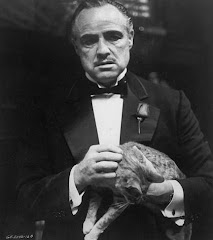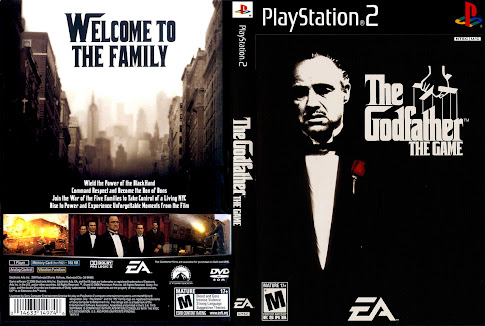Through out the movie, the Godfather I, many of us would agree that Francis Coppolo is interested in the incorporating a variety of literary devices in the movie. Here is a link to a short ten minutes video clip about F.F.Coppolo called The Godfather Trilogy: Francis-Ford Coppola's Notebook.
In the video clip he talks about the using of imagery, tone, suspense, cliche and exposition in the Godfather.
Some of the examples he gave was:
Cliche: in the beginning of the movie where Connie's marrige was held, children were sliding around the sandwichman. He mentioned that it was a very typically way to begin a movie with.
Suspence: One of the key scenes in the movie was the part where Michael's initiate step into the family business, the killing of Sollozo and McClusky. Clemenza gave Michael instructions before he head off(drop the gun right after kill the two); however, Michael didn't drop the gun immediately which was what Clemenza told him to do: Coppolo wanted to create suspense for the audience. Audience sees that Michael is not doing what he was suppose to so "hopefully the audience is dying drop it drop it drop it”(from the video clip)
HERE--> http://www.youtube.com/watch?v=EPLAnJ8Xozk
Saturday, May 30, 2009
Meg's Godfather Week 3: The Human Condition
There is this great song from "Spoon" called "The Underdog." This song is about someone of power, that doesn't bother about people below him. I feel this song relates to The Godfather. Don Vito Corleone cared about respect for himself; however, never forgot about people less powerful than he was. Michael, on the other hand, sometimes forgets. So who is the better Don? According to "Spoon", Don Vito Corleone is.
"The Underdog"
Picture yourself in the living room
Your pipe and slippers set out for you
I know you think that it ain't too far
But I, I hear the call of a lifetime ring
Felt the need to get up for it
Oh you cut out the middleman
Get free from the middleman
You got no time for the messenger,
Got no regard for the thing that you don't understand,
You got no fear of the underdog,
That's why you will not survive!
I want to forget how conviction fits
But can I get out from under it?
Can I gut it out of me?
It can't all be wedding cake
It can't all be boiled away
I try but I can't let go of it
Can't let go of it,
Cause you don't talk to the water boy
And there's so much you could learn but you don't want to know,
You will not back up an inch ever,
That's why you will not survive!
The thing that I tell you now
It may not go over well
And it may not be photo-op
In the way that I spell it out
But you won't hear from the messenger,
Don't wanna know 'bout something that you don't understand,
You got no fear of the underdog,
That's why you will not survive!
"The Underdog"
Picture yourself in the living room
Your pipe and slippers set out for you
I know you think that it ain't too far
But I, I hear the call of a lifetime ring
Felt the need to get up for it
Oh you cut out the middleman
Get free from the middleman
You got no time for the messenger,
Got no regard for the thing that you don't understand,
You got no fear of the underdog,
That's why you will not survive!
I want to forget how conviction fits
But can I get out from under it?
Can I gut it out of me?
It can't all be wedding cake
It can't all be boiled away
I try but I can't let go of it
Can't let go of it,
Cause you don't talk to the water boy
And there's so much you could learn but you don't want to know,
You will not back up an inch ever,
That's why you will not survive!
The thing that I tell you now
It may not go over well
And it may not be photo-op
In the way that I spell it out
But you won't hear from the messenger,
Don't wanna know 'bout something that you don't understand,
You got no fear of the underdog,
That's why you will not survive!
Meg's Godfather Blog Week 3: Literary Feature Hunt
In The Godfather, there is a prominent symbol of doors throughout the film.
Men and women are constantly being compared and contrasted, and as I said in a previous blog post, the sterotypes of the genders are put to the extreme. Doors are a symbol for separating the women from the men both personally and for business. At the end of the film, the perspective is from Kay, and the audience sees the door being shut in her face while the men talk inside. During the wedding, the women are whispering and listening outside the door to the office of Don Corleone. Permission is often needed for women to come inside the office. This symbol is a physical act of seperating the sexes.
Men and women are constantly being compared and contrasted, and as I said in a previous blog post, the sterotypes of the genders are put to the extreme. Doors are a symbol for separating the women from the men both personally and for business. At the end of the film, the perspective is from Kay, and the audience sees the door being shut in her face while the men talk inside. During the wedding, the women are whispering and listening outside the door to the office of Don Corleone. Permission is often needed for women to come inside the office. This symbol is a physical act of seperating the sexes.
Wednesday, May 27, 2009
FION POST eight: COMMENT
i want to comment on David's blog
He talked about the relationship between the golden spruce and the Godfather; Grand Hadwin and Michael are both heroic because they sacrifice something significant but relatively small to the whole in order to achieve something better and valuable: Grand Hadwin cut down a 300 year-old golden spruce, a tree which was vital in the history of the haida. His intention was to make the Haida realized that not only the golden spruce but other trees in the forest are also important: he sacrificed the golden spruce in exchange of realization from other people, the idea that all trees are equal and should be treated equally. Similarly, as David mentioned, Michael continue to lead his family business; however, at the end, he has to pay with his own death.
I think this display another human condition: someone must take initiative to sacrifice sth in order for others to realize bigger important ideas or issues.
He talked about the relationship between the golden spruce and the Godfather; Grand Hadwin and Michael are both heroic because they sacrifice something significant but relatively small to the whole in order to achieve something better and valuable: Grand Hadwin cut down a 300 year-old golden spruce, a tree which was vital in the history of the haida. His intention was to make the Haida realized that not only the golden spruce but other trees in the forest are also important: he sacrificed the golden spruce in exchange of realization from other people, the idea that all trees are equal and should be treated equally. Similarly, as David mentioned, Michael continue to lead his family business; however, at the end, he has to pay with his own death.
I think this display another human condition: someone must take initiative to sacrifice sth in order for others to realize bigger important ideas or issues.
Thursday, May 21, 2009
POST 7[FION]
Today we have watched an interview of Joseph Campbell called The Power of Myth; he talked about mythology and how does it associate with the human society. I find it especially interesting when he talk about the little voice we have inside our-self and that sometimes what we intend to do doesn’t match with who we are. The little voice, I think, has a good sense of what is moral and what is immoral(we understand them through experiences); however, the way we act is not always right. For example: all of us understand that lying is a bad thing, but in our daily life, despite that our little voice tells us not to lie(because we know lying is not a right thing to do), many of us still do.
Thursday, May 14, 2009
Meg's Godfather Week 2: Comment
I made a comment on Georgia and Aaron's blog. I liked the vocabulary that either Georgia or Aaron wrote describing all the different sons and Don Vito Corleone. The blog post wrote that Vito Corleone had all the traits of his sons. I raised the question that if a parent has more children, perhaps their personalities are more refined and specific, rather than one child with a personality very similar to their parents.
Meg's Godfather Week 2: Literary Feature Hunt
In "The Godfather", Francis Ford Coppola likes to play with juxtoposition.
At Michael's nephew and godson's baptism, there is this great scene where the shooting is mixed with the baptism, with a voiceover of the priest and Michael. There is the baby crying the background, and the priest asks,
"Do you renounce Satan?"
Michael says, "I do renounce him" as the shootings of the Corleone family's enemies fallout. The priest continues to ask this question, and the tension is built up like the scene where Michael shoots McClusky and Sollozzo in the restaurant.
This juxtoposition seems to shed light on the theme of "The Godfather." That whatever is done has consequences, concequences that cannot be forgotten.
At Michael's nephew and godson's baptism, there is this great scene where the shooting is mixed with the baptism, with a voiceover of the priest and Michael. There is the baby crying the background, and the priest asks,
"Do you renounce Satan?"
Michael says, "I do renounce him" as the shootings of the Corleone family's enemies fallout. The priest continues to ask this question, and the tension is built up like the scene where Michael shoots McClusky and Sollozzo in the restaurant.
This juxtoposition seems to shed light on the theme of "The Godfather." That whatever is done has consequences, concequences that cannot be forgotten.
Subscribe to:
Posts (Atom)


